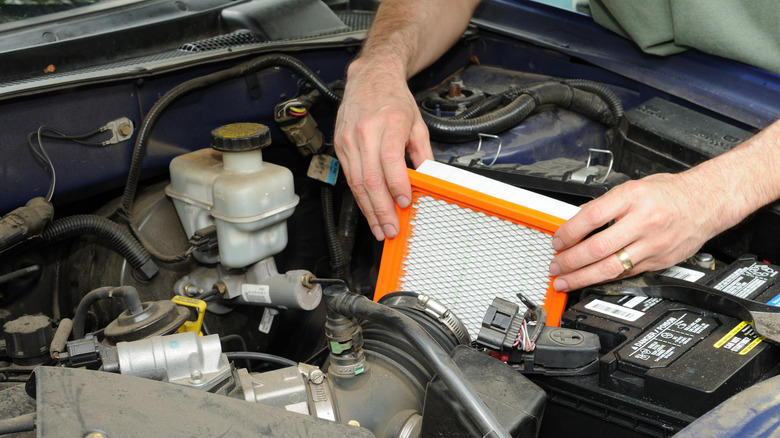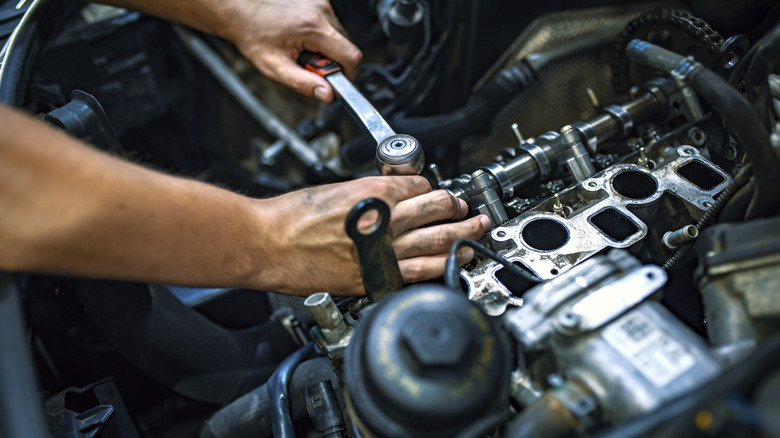3 Benefits Of Changing The Engine Air Filter On Your Vehicle
When you go through the long list of things you need to do to ensure your vehicle remains in tip-top condition for years to come, the engine air filter on your car probably isn't at the top of your list — if it makes the list at all. Nobody would blame you. After all, things like oil changes, tire rotations, and replacing fluids are the car maintenance items that typically get the most attention. However, ignoring your vehicle's air filter would be a mistake. The air filter performs the important job of keeping debris, dirt, and small particles from getting into your car's engine and damaging it.
When it's doing its job well, the air filter only allows clean air to enter your vehicle's engine. If it's not maintained or you never change your air filter, things will go wrong. You may notice things like your engine frequently stalling, sluggish acceleration, or black smoke coming from the tailpipe. If you notice any of these signs, it might be time to change your air filter. Changing the air filter is a DIY engine maintenance task you can do at home, and it's one of the easiest to do.
You'Il get improved Engine Performance
Your engine needs fresh air to perform optimally, and when the air filter is dirty, it impedes proper airflow to your engine, reducing its efficiency and power. That's why it's important to know when to change your car's air filter to keep your engine in good working order. Changing the air filter will improve the airflow to the engine, which has a vital role in ensuring efficient fuel combustion. That's because engines require substantially more air than fuel, and a high-performance air filter can help them maintain the ideal air-to-fuel ratio by allowing a higher volume of clean, oxygen-rich air into the engine.
You should keep in mind that the type of air filter you use can have an impact on your engine's performance. While the traditional paper filters that come with most cars are inexpensive and do a good job of trapping contaminants, they might allow some of the smallest particles to enter your car's engine. Over time, these types of air filters can become clogged, restricting airflow and reducing engine efficiency. In contrast, high-flow air filters made from materials like oiled cotton can increase airflow significantly, improving horsepower and acceleration without hurting your engine.
A clean filter prolongs engine life
A clean air filter acts as a barrier, trapping contaminants like dust, dirt, and debris before they can get into your engine. When you don't change your filter, these particles can make their way into the engine, causing abrasion and damage to engine parts and reducing the engine's lifespan. A clogged filter restricts airflow, forcing your engine to work harder. When this happens, you might find yourself dealing with things like degraded engine performance and costly repairs.
Unfortunately, it doesn't end there; restricted airflow from a dirty filter can also cause incomplete fuel combustion, resulting in higher emission levels. So, when it's time to get your car's emissions tested, it may not pass. Periodically changing your air filter ensures the engine always gets the proper mix of air and fuel necessary for efficient combustion and power generation. This will keep your car responsive and running smoothly and help extend the life of your engine.
It reduces emissions
Most of us are looking for ways to minimize our carbon footprint and contribute to a cleaner environment. For some, that might mean investing in a car with an eco-friendly engine, while others might make an effort to take public transportation more. If you're not in the market for a new car and taking the bus or train isn't an option for you, keeping up with your manufacturer's schedule for changing your vehicle's air filter can help you do your part in reducing emissions and improving air quality around you.
When the air-fuel balance gets thrown off because of an old or dirty air filter, your engine won't be able to burn fuel as efficiently. On the other hand, when you're using a clean, properly functioning air filter, your engine gets the right mixture of air and fuel, resulting in efficient combustion and an engine that can perform at its best without producing excess pollutants.



